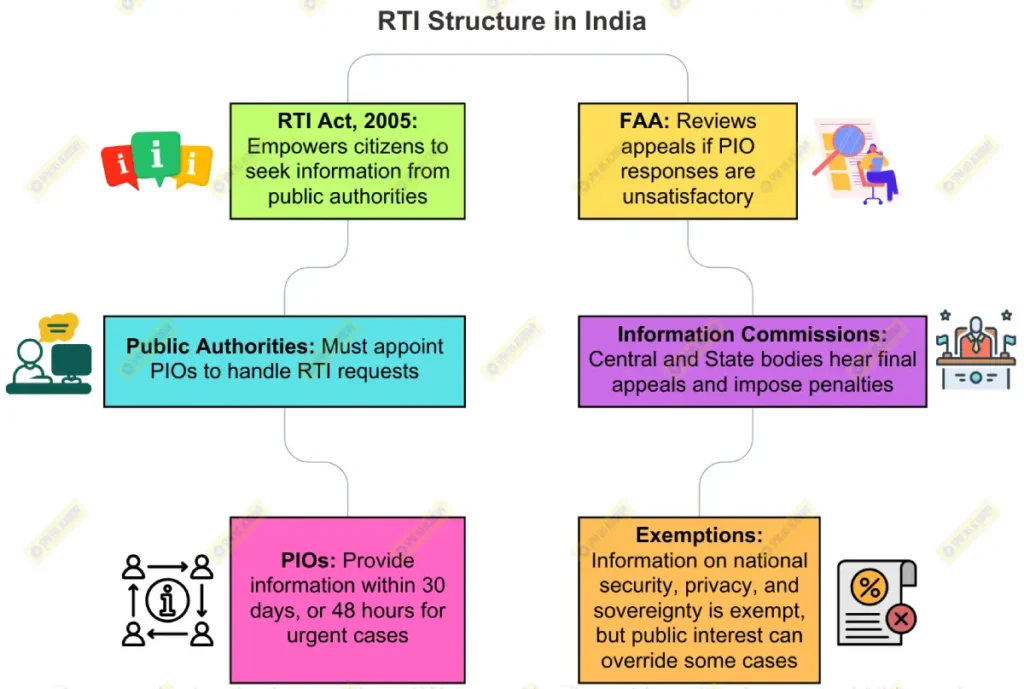- How far is the reason of rejection of the application justified?
- What is the remedy available to Nagen to get these information?
- Whether the SPIO failed to discharge his duties as enshrined in the RTI Act? If so, explain in detail.
The Right to Information (RTI) Act, 2005 was enacted to promote transparency and accountability in governance by empowering citizens to access information from public authorities. It has been a critical tool in strengthening democratic participation, especially for marginalized sections of society like the Below Poverty Line (BPL) population. However, challenges remain in its implementation. According to a report by the Commonwealth Human Rights Initiative (CHRI), around 40% of RTI applications face denial or procedural rejection, often on technical grounds, despite the Act’s intention to facilitate easy access to information. This case study reflects the broader ethical issue of balancing procedural correctness and substantive justice, particularly in cases involving disadvantaged applicants like Nagen.
In this context, the denial of Nagen’s request—despite his right to access information as a BPL individual—raises questions about the ethical discharge of public duties and the correct interpretation of the law under the RTI framework.

a. Justification of Application Rejection
The rejection of Nagen’s RTI application could be considered procedurally correct if evaluated strictly by formal requirements. Here’s how:
- Non-Payment of Required Fee: While Nagen belongs to the BPL category and is exempt from paying the fee, the exemption might not have been clearly indicated or verified by the SPIO. If the SPIO was unaware of Nagen’s BPL status due to lack of documentation, the rejection based on fee non-payment could be technically justified.
- Non-Standard Application Format: The RTI Act does not mandate a specific format for applications, but in practice, public offices often use standard formats to ensure clarity and completeness of information. If the application was unclear or ambiguous in a way that hindered proper processing, the SPIO may have used the lack of format as grounds for rejection.
- Administrative Efficiency: From an administrative perspective, ensuring that applications meet basic standards helps streamline processing and minimizes delays. A lack of clarity or missing documents could lead to misunderstandings or additional resource strain, providing a procedural basis for rejecting the application.
Unjustified Nature of Rejection
The reason for rejection based on non-compliance with format and fee is unjustified under the Right to Information (RTI) Act, 2005. The RTI Act prioritizes substance over procedural formality, especially for marginalized citizens like Nagen. Section 7 of the RTI Act requires the SPIO to offer assistance to applicants, particularly when they are from vulnerable categories, such as those Below Poverty Line (BPL). As Nagen belongs to the BPL category, he is exempt from paying the fee, and procedural errors in the application should not lead to a denial of information.
2. Remedies Available to Nagen
Nagen has the following remedies under the RTI Act:
- Appeal: Nagen can file a first appeal within 30 days of the rejection to the Appellate Authority, contesting the SPIO’s refusal to provide the information.
- Second Appeal: If the first appeal does not resolve the issue, Nagen can escalate the matter to the State Information Commission.
- Complaint to Information Commission: Nagen can directly approach the State Information Commission, highlighting the wrongful rejection of his request.
These mechanisms are built into the RTI Act to safeguard citizens from arbitrary or unfair denial of information.

3. SPIO’s Failure to Discharge Duties
The SPIO failed in his duty under the RTI Act. According to Section 5(3), the SPIO is obligated to assist applicants, especially those from disadvantaged backgrounds, in accessing the requested information. As Nagen belongs to the BPL category, the SPIO should have:
- Exempted the fee: As per Section 7(5), BPL applicants are not required to pay any application fees.
- Provided Guidance: The SPIO had a duty to assist Nagen in addressing the procedural issues with his application rather than rejecting it without notice.
4. Procedural vs. Substantive Issues – Ethical Perspectives
The case highlights the tension between procedural formality and substantive justice, reflecting different ethical viewpoints.
Positive Perspective (Substance over Procedure):
- Aristotle’s Ethics of Justice emphasizes that laws should focus on achieving the common good, where rigid procedural compliance should not hinder fairness or access to rights. In this case, the substantive goal is to ensure Nagen, a disadvantaged citizen, receives the information, regardless of procedural mistakes.
- John Rawls’ Theory of Justice supports the idea of providing fair and equitable access to information, especially for the marginalized, aligning with the RTI’s objective of promoting transparency and empowering vulnerable populations.
Negative Perspective (Procedure as Essential):
- Immanuel Kant’s Deontological Ethics emphasizes adherence to rules and processes as a reflection of moral duty. From this perspective, the SPIO might argue that following correct procedures ensures consistency and prevents misuse of the system. However, Kantian ethics also emphasize treating individuals with respect, which was neglected by not assisting Nagen.
- Max Weber’s Bureaucratic Ethics argue that strict adherence to rules is essential for maintaining the efficiency and impartiality of public administration. While procedural correctness is crucial, Weber also highlights the role of bureaucracy in serving the public interest, which was compromised in this case.
In this scenario, the SPIO failed to balance procedural obligations with the substantive purpose of the RTI Act—empowering citizens, particularly the vulnerable, to access information. Ethical frameworks from Aristotle and Rawls emphasize the need for fairness and responsiveness to individual circumstances over rigid proceduralism, while thinkers like Kant and Weber caution against the breakdown of procedural norms. However, in this context, substantive justice clearly outweighs procedural rigidity, and Nagen’s request should have been handled with greater sensitivity and adherence to the law.
Check out UPSC Coaching Centre Guwahati | APSC Coaching Centre Guwahati | Crack APSC Exam | UPSC Civil Services Exam | Ethics Paper in UPSC Exams











